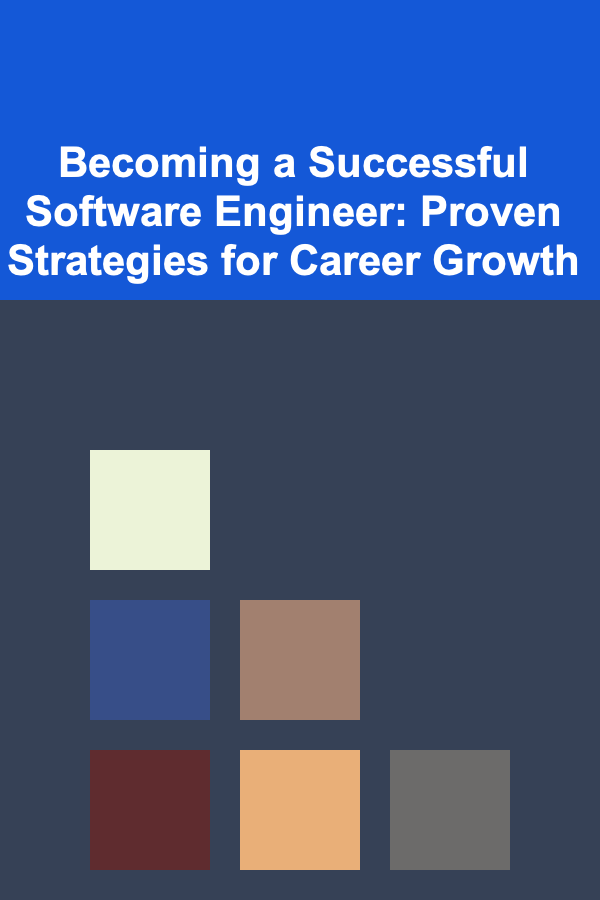
Becoming a Successful Software Engineer: Proven Strategies for Career Growth
ebook include PDF & Audio bundle (Micro Guide)
$12.99$5.99
Limited Time Offer! Order within the next:

The journey to becoming a successful software engineer is one filled with both challenges and opportunities. As the technology landscape evolves rapidly, software engineers must adapt, learn, and consistently improve their skills to stay relevant in the industry. Success is not merely defined by technical expertise, but also by the ability to collaborate, think critically, and manage one's career development. In this actionable guide, we will explore proven strategies that can help you grow in your career as a software engineer and unlock long-term success.
Build a Strong Technical Foundation
Master Core Programming Languages
No matter how the technology landscape evolves, strong programming skills remain fundamental to success as a software engineer. While you may specialize in a certain domain or technology stack, having a solid understanding of core languages will open doors to more opportunities. Languages like Python, Java, C++, and JavaScript are in high demand across many industries.
- Deep Dive into One Language: Focus on mastering one language to an expert level. Understanding its nuances, libraries, frameworks, and best practices will make you a more effective developer.
- Learn Multiple Languages: Diversify your skills by learning multiple programming languages over time. This allows you to choose the best language for different tasks, and it helps in adapting to various projects.
Understand Data Structures and Algorithms
Data structures and algorithms (DSA) are the backbone of efficient software development. Mastering DSA enables you to write more optimized code, solve complex problems, and excel in technical interviews. Even though coding may often seem like an art, understanding the underlying principles of data storage, retrieval, and manipulation is key to writing high-performance code.
- Focus on Key Concepts: Make sure you understand fundamental data structures such as arrays, linked lists, trees, heaps, and hash maps, as well as essential algorithms for sorting, searching, and graph traversal.
- Practice Consistently: Use platforms like LeetCode, HackerRank, and CodeSignal to practice algorithmic problems regularly. The more problems you solve, the better your problem-solving skills will become.
Keep Up With Emerging Technologies
The field of software engineering is ever-evolving, with new frameworks, libraries, and tools being released regularly. Staying up-to-date with the latest trends ensures that you are not left behind and allows you to implement cutting-edge solutions.
- Follow Industry Blogs: Subscribe to blogs, newsletters, and forums that focus on emerging trends like artificial intelligence, blockchain, cloud computing, and quantum computing.
- Attend Conferences and Meetups: Attend technical conferences, webinars, or local meetups to engage with experts and peers in the field. Networking and learning from others' experiences can provide valuable insights.
Develop Soft Skills for Career Growth
Communication is Key
While technical skills are crucial, soft skills---especially communication---are what allow software engineers to thrive in a collaborative environment. Whether you're explaining a technical solution to non-technical stakeholders, participating in a code review, or collaborating with team members, communication plays a vital role in your success.
- Practice Clear Communication: Aim for clarity and brevity when discussing technical concepts. Practice breaking down complex topics into simpler terms to ensure that everyone, regardless of technical background, can follow your explanation.
- Embrace Active Listening: Listening actively to your colleagues helps you understand their perspectives, needs, and challenges. It also allows you to respond thoughtfully rather than react impulsively.
Collaboration and Teamwork
Software engineering is rarely a solo endeavor. In most cases, you will be working in teams with designers, product managers, other engineers, and stakeholders. Collaborating effectively in such teams is key to delivering high-quality products on time.
- Be Open to Feedback: Accept constructive criticism graciously. Use feedback as a tool for growth, and work towards continuous improvement in your technical and interpersonal skills.
- Foster a Positive Team Culture: Encourage open communication, support your colleagues, and be proactive in helping others when they need assistance. Building trust and camaraderie within your team leads to better collaboration.
Time Management and Work-Life Balance
As you progress in your career, balancing multiple projects and deadlines becomes a challenge. Effective time management is crucial to avoid burnout and ensure that you meet your objectives without sacrificing personal well-being.
- Prioritize Tasks: Use tools like the Eisenhower Matrix to categorize tasks by urgency and importance. Focus on completing high-priority tasks first and avoid getting bogged down in non-urgent activities.
- Avoid Overworking: While being committed to your work is important, maintaining a healthy work-life balance is just as crucial for long-term success. Set boundaries to ensure that you have time for relaxation, hobbies, and spending time with loved ones.
Contribute to Open Source and Personal Projects
Building a Portfolio
One of the most effective ways to demonstrate your skills is by building a personal portfolio of projects. Contributing to open-source software, creating your own projects, or collaborating on GitHub showcases your abilities and initiative to potential employers or clients.
- Start with Small Projects: If you're new to open-source contributions, begin by fixing bugs or enhancing documentation. As you gain confidence, take on larger tasks like adding new features or creating libraries.
- Create Portfolio Projects: Personal projects that showcase your skills can be a powerful addition to your resume. Whether it's a web application, a mobile app, or a machine learning model, having a tangible project to show off to potential employers sets you apart.
Engage with the Open-Source Community
Contributing to open-source projects not only helps you gain experience and recognition, but it also allows you to interact with seasoned developers. Open-source platforms like GitHub, GitLab, and Bitbucket provide a great environment to collaborate with others.
- Contribute to Well-Known Projects: Find open-source projects related to your field of interest. Contributing to reputable projects enhances your visibility and credibility in the developer community.
- Network and Learn: Engage with project maintainers and contributors. You'll gain exposure to new technologies, improve your coding skills, and create professional connections.
Continuously Learn and Adapt
Invest in Professional Development
A successful software engineer is always learning and growing. The tech industry moves fast, and continual learning is crucial to staying ahead.
- Take Online Courses: Platforms like Coursera, Udemy, and edX offer a wealth of courses on everything from programming languages to cloud computing. Select courses that align with your career goals and interests.
- Read Books : Books like Clean Code by Robert C. Martin and Design Patterns by Erich Gamma et al. provide valuable insights into software engineering best practices and design principles.
- Pursue Certifications: Certifications in areas like cloud computing, machine learning, or DevOps can add value to your skill set and make you more competitive in the job market.
Learn From Failures and Feedback
In your career, you will encounter challenges, failures, and setbacks. It's essential to view these as learning opportunities rather than roadblocks. Successful software engineers take feedback in stride, analyze mistakes, and use them as stepping stones for improvement.
- Learn from Mistakes: After encountering a failure, take time to reflect on what went wrong. Consider what you can do differently next time, and make improvements accordingly.
- Seek Mentorship: Find a mentor who can guide you through difficult career decisions and provide insights into your professional growth. Mentorship helps you avoid common pitfalls and accelerates your development.
Networking and Building a Professional Reputation
Build Your Personal Brand
As you grow in your career, it's important to build a personal brand that showcases your skills, values, and professional reputation. Building a strong presence in the developer community can help you unlock new career opportunities.
- Contribute to Blogs or Articles : Writing about your experiences, challenges, and insights in software engineering can establish you as an expert in the field. Platforms like Medium, Dev.to, and LinkedIn are excellent places to share your knowledge.
- Public Speaking: Attend conferences or give talks on topics you're passionate about. Public speaking boosts your visibility, strengthens your professional network, and enhances your credibility.
Grow Your Professional Network
Building meaningful professional relationships can open doors to new opportunities and collaborations.
- Engage in Social Media: Platforms like Twitter and LinkedIn are excellent for connecting with other developers, industry leaders, and potential employers. Share your accomplishments, projects, and thoughts on current industry trends.
- Attend Conferences and Meetups: Networking at events provides you with valuable opportunities to meet peers, learn from industry leaders, and discuss the latest trends with like-minded professionals.
Conclusion
Becoming a successful software engineer requires a blend of technical expertise, soft skills, continuous learning, and networking. It's about mastering core programming languages, staying up-to-date with emerging technologies, and contributing to meaningful projects. Additionally, personal growth through communication, time management, and work-life balance is key. By embracing these proven strategies, you can build a fulfilling and successful career that continues to grow in line with the ever-changing tech industry. Keep pushing the boundaries of your abilities, invest in professional development, and always be open to learning and adapting, and success will follow.

How to Find Free or Low-Cost Decor Ideas Online
Read More
How to Manage Sensitive Files with Encryption
Read More
How to Sketch Animals in Different Environments
Read More
How To Build a Skincare Routine for Athletes
Read More
How to Create a Social Media Content Calendar That Actually Works
Read More
10 Tips for Creating a Baby Nursery Design Plan with a Planner
Read MoreOther Products

How to Find Free or Low-Cost Decor Ideas Online
Read More
How to Manage Sensitive Files with Encryption
Read More
How to Sketch Animals in Different Environments
Read More
How To Build a Skincare Routine for Athletes
Read More
How to Create a Social Media Content Calendar That Actually Works
Read More